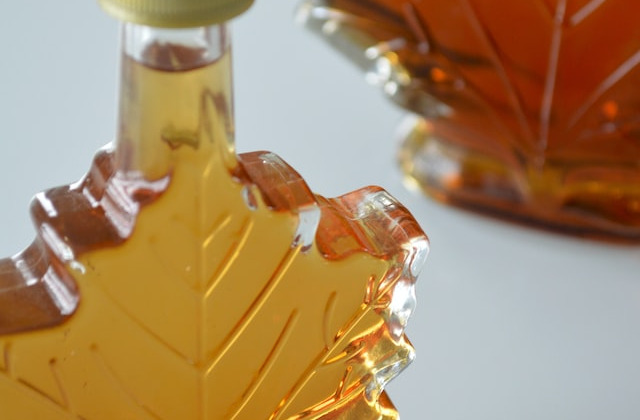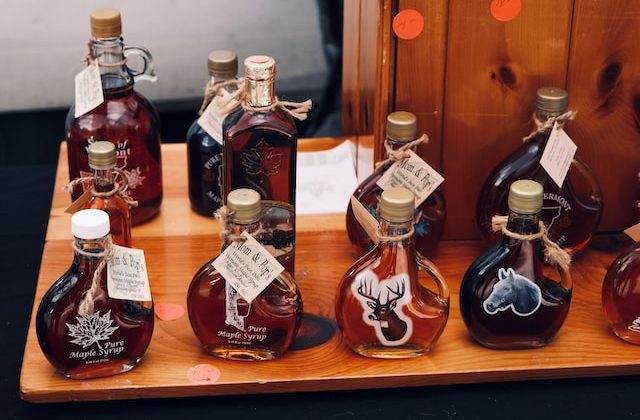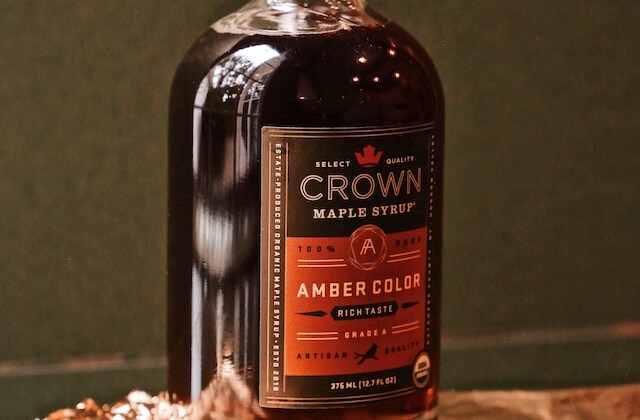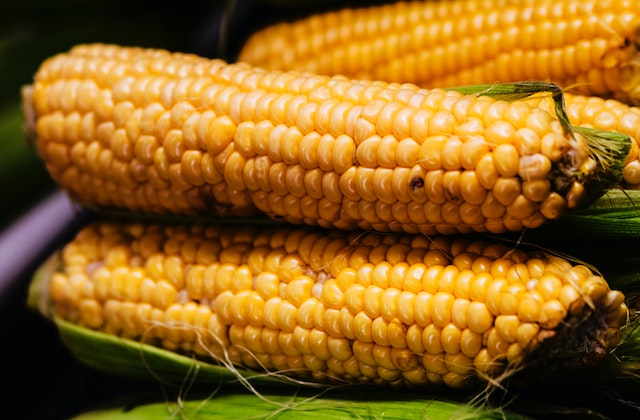
Many parents are cautious about introducing their babies to sweeteners such as sugar, honey, or even maple syrup. This is because there is a belief that early exposure to sweet flavors can develop a preference for sugary foods that can last a lifetime. However, as babies grow and become old enough to try other foods beyond breast milk or formula, parents may wonder if they can safely introduce maple syrup to their little ones.
- Is Maple Syrup Safe For Babies?
- When Can Babies Have Maple Syrup? — A Brief Timeline
- What Is Maple Syrup?
- The Science Behind Maple Syrup
- What Are The Health Benefits Of Maple Syrup For Babies?
- Is It Safe For Babies To Eat Maple Syrup?
- What Type Of Maple Syrup Can You Give Your Baby?
- Are There Alternatives To Maple Syrup?
- Can I Give My Baby High Fructose Corn Syrup?
- Is Honey A Good Alternative To Maple Syrup?
- Conclusion
Is Maple Syrup Safe For Babies?

It is not uncommon for parents to wonder about what types of foods they can safely introduce to their babies. For example, many may ask, “Can babies have maple syrup?”
In general, most pediatricians DO NOT recommend feeding maple syrup to babies just yet. Why? Well, it’s similar to the question of when it’s safe for babies to start consuming solid foods. Babies’ digestive systems are still developing and cannot handle maple syrup or other syrupy products at such a young and tender age like:
- Honey
- Corn syrup
- Cane sugar
Research also shows that allowing young children to consume honey increases their risk of botulism.
Although infant botulism is present when ingesting maple syrup, we still recommend staying on the safe side. Also, note that some babies may have maple sap allergies.
When Can Babies Have Maple Syrup? — A Brief Timeline
Let us have a look at the timeline or stages of development of children.
Birth To 4 Months
During this period, your baby’s diet comprises generally of milk and the reason is simple —- your child’s digestive system is not fully developed yet.
Breast milk and formula milk are the ONLY FOOD SOURCES your babies should have. Water is not even that necessary for babies at this point.
Four To Six Months
You can slowly introduce solid food to your baby at this period but it needs to be soft and mashed for your baby to consume considering they do not have full-grown teeth yet.
Thus, solid foods are introduced with caution. Babies cannot chew still, and giving them solid foods can pose a serious choking hazard and risk infant botulism.
12 Months AND Above
By the time they reach 12 months, you can introduce your babies to maple syrup. At this time, they have more balanced acids in their intestines and can digest.
With proper guidance and timing, your baby will eventually develop the stomach to digest syrup and other solids!
What Is Maple Syrup?

Maple syrup is a beloved sweet treat that has been enjoyed for generations. Its origins can be traced back to Native American traditions, where they would use the sap of maple trees to make various edible products, including “Sinzibuckwud” or maple syrup.
Today, maple syrup is produced from several species of trees in the USA and Canada and is widely used as a natural sweetener for desserts and stews. It has become a staple in many households around the world.
While maple syrup is high in sugar, its sugar content is lower than that of high fructose corn syrup. Nonetheless, it is still important to consume it in moderation, especially for babies and young children who are not yet able to digest it properly.
The Science Behind Maple Syrup
Maple syrup is a natural sweetener derived from a maple tree.
The maple tree sap is collected from maple trees to produce this thick syrup, a healthy alternative to sugar that packs the same sweetness and flavor.
Today, maple syrup has a lot of uses besides topping your pancake. Now, they can be incorporated into a lot of dishes.
Most importantly, maple syrup has some significant nutritional benefits. We would get to these in a bit!
What Are The Health Benefits Of Maple Syrup For Babies?
In exceptional cases, babies can consume maple syrup but only with the approval and advice of your family pediatrician. It is very crucial to let your pediatricians know what is going on with your baby.
Here are some health and nutritional benefits of letting babies have maple syrup:
1. Address Constipation
A lot of parents use maple syrup as a natural way of addressing constipation in their babies. As a caveat, make sure your pediatrician approves of this remedy. Plus, make sure you know what you are doing.
Maple syrup has proven to be beneficial in helping constipated babies. Mixing this concoction is easy because it only requires a tablespoon of maple syrup.
You must dilute the syrup with five ounces of water and transfer the mix to your baby’s bottle. Allow them to drink it and observe what happens next.
2. Rich in Antioxidants
Believe it or not, this sweet pancake syrup contains many antioxidants that can help fight any disease and also benefit our body. It has up to 24 antioxidants and minerals such as zinc, potassium, iron, calcium, etc.
That said, maple syrup is a much healthier and better overall option for you than your regular table sugar.
Not only do you satisfy your sweet tooth when you consume maple syrup, but you are also consuming a lot of antioxidants.
Is It Safe For Babies To Eat Maple Syrup?

Yes, as mentioned earlier, it is advisable to give maple syrup to babies in moderation. While maple syrup has several benefits, including being a natural sweetener, it still contains high sugar content and should not be given as a treat or health remedy for babies.
Babies are not well-equipped to digest sugary foods, and consuming such foods can lead to the development of harmful bacteria and other diseases. Infants under the age of one do not need to consume processed sugar or processed food in their diet.
Instead, parents should focus on providing their babies with nutritious foods such as fruits and vegetables. Parents can set the standard for their baby’s diet by introducing healthy foods early on. If processed and sugary foods are introduced at a young age, babies may develop a preference for these foods in the future.
What Type Of Maple Syrup Can You Give Your Baby?
Not all maple syrups are created equal. While they are all collected as sap from maple trees, their flavors vary depending on their color and classification.
When you look at the maple syrup in your grocery aisle, you’ll find it comes in different colors like amber, golden brown, and more. Each color represents a certain kind of flavor that might not be ideal for your baby’s palate.
Maple syrups that are amber or golden brown have a mild flavor that is safer for babies to consume.
In contrast, dark-colored maple syrups have a much stronger flavor that adults generally prefer.
Between the two, golden brown and amber-colored maple syrups are the safer options for your baby. They are sweet and mild, just enough for them to enjoy without overwhelming their taste buds.
Are There Alternatives To Maple Syrup?

Aside from maple syrup, there are many sweet foods and syrups out there that you can safely give to your baby and kids. You may want to check them out for your baby.
Rest assured, these are healthy alternatives that pack the same sweet flavor.
1. Agave
Honey and maple syrup are great natural sweeteners but unfortunately, maple syrup contains clostridium botulinum, a set of bacteria that increases the risk of your baby having infant botulism which attacks the nervous system.
If you do not want to expose your baby to this disease, Agave is a great alternative. It is sweet and flavorful and has many health and nutritional properties.
The only drawback of using Agave is its relatively high sugar content. We highly recommend limiting the amount of Agave you give your child.
2. Brown Rice Syrup
An alternative to Agave is brown rice syrup. Although it is not as sweet as the Agave, it packs a nice and sweet flavor. Also, brown rice syrup DOES NOT give your kids that sugar spike, unlike maple syrup and regular sugar.
3. Fruits
Fruits always make an excellent treat for your kids. It is naturally sweet, contains different vitamins and minerals, and makes a great snack!
THE BEST PART: They are safe for your little one to consume, even under 12 months.
Here are some of the best fruits you can let your baby have:
- Apricots
- Apples
- Bananas
- Cherries
- Strawberries
Of course, they make a delicious and refreshing fruit drink minus the sugar!
Do note, that your baby SHOULD NOT consume any seeds from the fruit. It may pose a choking hazard later on.
4. Stevia
Stevia has gained much popularity these days as a great alternative to sugar. It has all the tasty sugary sweetness, despite being sugar-free.
Today, you will find many food items and recipe books that use stevia instead of sugar, which is an excellent testament to what it is.
Besides being a sugar-free sweetener, stevia has some benefits because it is rich in vitamins and minerals, and if you ask us, it sounds like a win-win for you and your baby.
Can I Give My Baby High Fructose Corn Syrup?

Unfortunately, you cannot give your baby corn syrup. While maple and high-fructose corn syrup share the same flavor, they’re made entirely of different things.
Corn syrup is usually composed of many artificial sweeteners and chemicals to derive the flavor.
In comparison, pure maple syrup is naturally derived from a maple tree.
We are certain you do not want your baby to consume chemicals, bacteria, and artificial substances at a tender age. Anything with chemicals is always a BIG NO!
Some of these foods can also cause diaper rashes for your baby, so it is best to steer clear of anything artificial and not risk it.
Is Honey A Good Alternative To Maple Syrup?
Because of how honey is created, it should not be given to babies. We all know honey is naturally produced, bees make it, and voila, you’ve got honey.
But this sweet concoction is not entirely safe for babies because of how it is stored. The raw product contains botulism spores, which are detrimental to the condition of infants. That said, pure maple syrup is still better than giving your baby honey since the sap is sourced directly from the trees.
However, there are some cultures where they give babies honey while they ‘are still babies. However, for your baby’s safety, always consult a doctor.
Conclusion
In conclusion, it is best to avoid feeding maple syrup to babies until they reach 12 months old. At this stage, their digestive system and other bodily functions will have matured enough to handle the sugar content.
Maple syrup has a significant amount of sugar, and introducing it to your baby before 12 months old may expose them to health risks like a sugar spike. While maple syrup is a popular sweetener, there are other healthier options available with a lower sugar percentage.
You can always opt for these alternatives if your child is not yet 12 months old, and you would still find them effective in sweetening your baby’s food. However, it is crucial to monitor your baby’s sugar consumption, regardless of the sweetener used.
Excess sugar consumption in young children can lead to various health problems, so it is vital to be mindful of what they consume. By introducing nutritious foods like fruits and vegetables early on, you can set a healthy standard for your child’s diet and avoid future health issues related to sugar consumption.
Leave a Reply
You must be logged in to post a comment.